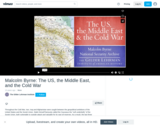
This is an article about Jimmy Carter's presidency and his Strategic Arms Objectives.
- Subject:
- Social Studies
- Material Type:
- Case Study
- Provider:
- University of North Carolina
- Date Added:
- 12/01/2023

This is an article about Jimmy Carter's presidency and his Strategic Arms Objectives.

American Government is designed to meet the scope and sequence requirements of the single-semester American government course. This title includes innovative features designed to enhance student learning, including Insider Perspective features and a Get Connected Module that shows students how they can get engaged in the political process. The book provides an important opportunity for students to learn the core concepts of American government and understand how those concepts apply to their lives and the world around them. American Government includes updated information on the 2016 presidential election.Senior Contributing AuthorsGlen Krutz (Content Lead), University of OklahomaSylvie Waskiewicz, PhD (Lead Editor)


A lesson plan for learning about nuclear weapons and nonproliferation agreements. Takes students through the process of comparing and contrasting various treaties and of evaluating their relative successes and failures. Includes a capstone assignment that requires students to apply what they have learned by composing their own treaty that addresses present-day challenges.

Read about America's Central Intelligence Agency and how it works to provide national security intelligence. The resource discusses careers with the CIA, how the organization is run and its history. Also view the "World Factbook" section, an excellent resource for learning about countries all over the world.

Professor Malcolm Byrne of George Washington University discusses the policies of the United States overseas, the balance between idealism and reality, and why those in the Middle East do not like Americans. Byrne explains the importance of understanding what is happening currently the history of that region must be understood. [1:10:46]

[Free Registration/Login Required] Historian Norman Saul addresses a crowd discussing why Russia was interested and supportive of the Civil War in America. Russia was also facing unrest over serfdom similar to the conflict over slavery in the United States. Understand more abou this reslationship in this presentation. [25:01]

Offers a summary of this resolution which supported President Johnson's actions in Vietnam and also provides an easy to read version of the complete text.

U.S. History is designed to meet the scope and sequence requirements of most introductory courses. The text provides a balanced approach to U.S. history, considering the people, events, and ideas that have shaped the United States from both the top down (politics, economics, diplomacy) and bottom up (eyewitness accounts, lived experience). U.S. History covers key forces that form the American experience, with particular attention to issues of race, class, and gender.Senior Contributing AuthorsP. Scott Corbett, Ventura CollegeVolker Janssen, California State University, FullertonJohn M. Lund, Keene State CollegeTodd Pfannestiel, Clarion UniversityPaul Vickery, Oral Roberts UniversitySylvie Waskiewicz

In 1820, James Monroe articulated the US foreign policy goal of ending European colonization in the Americas. [14:32]
Khan Academy learning modules include a Community space where users can ask questions and seek help from community members. Educators should consult with their Technology administrators to determine the use of Khan Academy learning modules in their classroom. Please review materials from external sites before sharing with students.


U.S. History is designed for a two-semester American history sequence. It is traditional in coverage, following a roughly chronological outline, and using a balanced approach that includes political, economic, social, and cultural developments. At the same time, the book includes a number of innovative and interactive features designed to enhance student learning. Instructors can also customize the book, adapting it to the approach that works best in their classroom.

The initial source for links to all aspects of the Buchanan presidency, including information on his cabinet, domestic policy and foreign policy. From the Miller Center.

Video and transcript of the remarks made by President Johnson upon signing the Nuclear Nonproliferation Treaty of July, 1968. [13:14]

Read general information about the establishment of the National Security Council, current staff, and its function within the government.

The official site for The White House and the Executive Branch of government. The site offers current as well as historical events, speeches, documents, and more. Includes up to date information about the Obama administration, current issues, and foreign policy.